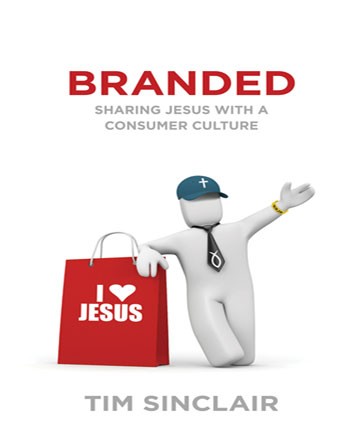This weekend, I picked up Branded: Sharing Jesus With a Consumer Culture by Tim Sinclair. I was a bit skeptical when I started reading this book that touted itself as a new marketing plan for Jesus. I was pleasantly surprised to encounter a fresh look at what evangelism looks like in light of the consumer culture that we live in today. This book was a great reminder of what it means to truly look like, act like, and love like Jesus in an effort to win people for the Kingdom. Below are some thoughts I highlighted while reading…
- We’re pretty good at say-ing, but not so good at do-ing. We’re pretty good at act-ing, but not so good at be-ing. We’re pretty good at pretend-ing, but not so good at truly liv-ing.
- Jesus had the remarkable ability to be culturally and socially relevant, while still delivering a powerful, life-changing message.
- Lack of competition breeds laziness. Laziness breeds apathy. And eventually, apathy breeds disaster.
- According to the World Christian Encyclopedia, the church spends $1,551,466 for each new follower of Jesus.
- It’s not exciting the people inside the church enough to go reach people outside the church.
- We’ve seemingly created places of worship that keep people in . . . but don’t bring people in. Or send passion-filled people out.
- How are children supposed to get a handle on faith if mom and dad can’t agree on one? If one religion is okay for one parent, and another is okay for the other parent, it’s natural for our kids to believe there is no right way or wrong way. It’s no wonder that moral relativism is so prevalent.
- Most people no longer think they need what Jesus offers. We’re a self-reliant world with no desire to follow (or cater to) anybody but ourselves.
- “People are like tea bags. You find out what’s really inside when you put them in hot water.”
- Living a better lifestyle doesn’t inspire us to draw closer to God. Drawing closer to God inspires us to live a better lifestyle.
- Christians often try to change a person’s culture rather than let God change her heart. We try to force others to act like us, with the hope that they’ll eventually believe like us. That’s entirely backward. Heart changes lead to a change in actions, not the other way around.
- It’s not our job to present a perfect person to Jesus—but to present a perfect Jesus to people.
- Exceed expectations and you win every time.
- Christians, like many social or political action groups, are often known more for what they’re against, rather than what (and Who) they’re for.
- For some reason, over time, Christ-followers have put themselves in a boring box. Our packaging (lifestyle) gives the impression that Christianity is more about rules than freedom.
- Passionate customers openly share with their friends.
- The problem is that we’re forcing the issue. We’re attempting to make people believe, rather than make them want to believe. There’s a big difference.
- When love is authentically lived out, it can be seen both up close and from a distance.
- In a world full of selfishness and slander, hypocrisy and hate, love sticks out like a pair of white headphones.
- When power and influence are based on who you say you are, then it’s only fair for them to be taken away based on who you really are.
- What if we were intentional about befriending those people many Christians consider unlovely?
- Each time he said, “My grace is all you need. My power works best in weakness.” So now I am glad to boast about my weaknesses, so that the power of Christ can work through me. That’s why I take pleasure in my weaknesses, and in the insults, hardships, persecutions, and troubles that I suffer for Christ. For when I am weak, then I am strong. (2 Cor. 12:9–10)
Categories:

